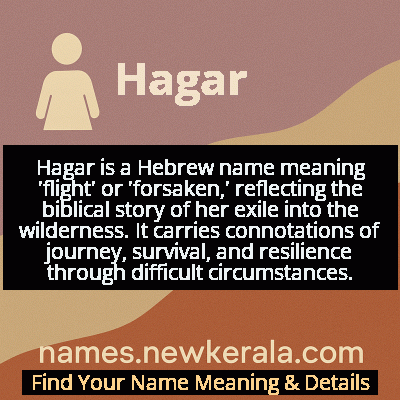Hagar Name Meaning & Details
Origin, Popularity, Numerology Analysis & Name Meaning of Hagar
Discover the origin, meaning, and cultural significance of the name HAGAR. Delve into its historical roots and explore the lasting impact it has had on communities and traditions.
Name
Hagar
Gender
Female
Origin
Hebrew
Lucky Number
8
Meaning of the Name - Hagar
Hagar is a Hebrew name meaning 'flight' or 'forsaken,' reflecting the biblical story of her exile into the wilderness. It carries connotations of journey, survival, and resilience through difficult circumstances.
Hagar - Complete Numerology Analysis
Your Numerology Number
Based on Pythagorean Numerology System
Ruling Planet
Saturn
Positive Nature
Ambitious, efficient, realistic, and authoritative.
Negative Traits
Materialistic, stressed, confrontational, and can be overly ambitious.
Lucky Colours
Dark blue, black.
Lucky Days
Saturday.
Lucky Stones
Blue sapphire, amethyst.
Harmony Numbers
2, 4, 6.
Best Suited Professions
Business leaders, managers, financial services, law enforcement.
What People Like About You
Leadership, determination, organizational skills.
Famous People Named Hagar
Hagar
Biblical Figure
Egyptian handmaid of Sarah, mother of Ishmael, considered matriarch in Islamic tradition
Hagar the Horrible
Comic Strip Character
Viking protagonist in popular comic strip by Dik Browne and Chris Browne
Hagar Olsson
Writer/Critic
Finnish-Swedish modernist writer and literary critic
Name Variations & International Equivalents
Click on blue names to explore their detailed meanings. Gray names with will be available soon.
Cultural & Historical Significance
The cultural impact of Hagar extends beyond religious texts into literature, art, and social discourse. Feminist theologians have reinterpreted her story as emblematic of marginalized women's experiences, while her journey has inspired countless works about exile, survival, and motherly devotion. The name continues to resonate as a symbol of resilience across cultures, particularly among communities that value stories of overcoming adversity through faith and determination.
Extended Personality Analysis
Individuals named Hagar are often perceived as resilient and independent, reflecting the biblical Hagar's survival in the wilderness. They typically demonstrate strong maternal instincts and protective qualities, coupled with remarkable endurance in facing life's challenges. These personalities frequently exhibit a blend of practicality and spirituality, able to navigate difficult circumstances while maintaining faith in better outcomes. Their journey-oriented mindset makes them adaptable to change, though they may sometimes struggle with feelings of isolation or being misunderstood.
Hagars tend to be deeply intuitive and resourceful, possessing an innate ability to find solutions where others see only obstacles. They often display a quiet strength that emerges most powerfully during crises, along with a compassionate understanding of others' struggles born from their own experiences of hardship. While they can be fiercely independent, they also value deep, meaningful relationships and often serve as pillars of support within their families and communities. Their complex emotional landscape combines vulnerability with extraordinary fortitude, creating individuals who transform personal trials into sources of wisdom and strength.
Modern Usage & Popularity
In contemporary naming practices, Hagar maintains a niche but meaningful presence, primarily chosen by parents seeking names with deep historical and spiritual resonance rather than following current trends. The name sees most frequent use in Israel and among Jewish communities worldwide, where its biblical origins are valued, while the Arabic variation 'Hajar' is more common in Muslim populations. Modern usage often reflects an appreciation for strong female figures from religious texts, though some parents may be hesitant due to the character's challenging narrative. The name has experienced minor revivals during periods of increased interest in biblical and historical names, but generally remains outside the top name rankings in English-speaking countries.
Symbolic & Spiritual Meanings
Symbolically, Hagar represents the journey from oppression to liberation, embodying themes of exile, survival, and divine protection in wilderness experiences. The name evokes the paradox of being both forsaken and chosen, reflecting how profound transformation often emerges from desperate circumstances. It symbolizes the strength found in vulnerability and the unexpected blessings that can arise from situations of abandonment or displacement, making it a powerful emblem of resilience and faith against overwhelming odds. The story's central image of finding water in the desert has become a universal metaphor for discovering sustenance and hope in seemingly barren situations, while her maternal protection of Ishmael represents the fierce, sustaining power of love in the face of adversity.

